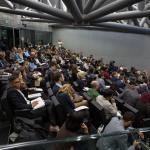A Commentary by Professor Ilona Kickbusch
The world of global health is changing rapidly. Until recently the focus of this change was the move to the many new private partners in the global health endeavour which has led to the creation of many new global health programmes and initiatives. But a new shift is already under way. The 2nd symposium on Global Health Diplomacy entitled “Negotiating Health in the 21st century – Analysing the Power shift in Global Health at National and Global Level” organized by the new Global Health programme of the Graduate Institute set out to consider the role of the emerging economies, regional groupings and foreign policy actors in global health. More than 200 participants– diplomats, health professionals, representatives of international organisations and academics - attended this conference in the Auditorium Jacques-Freymond on 21 October 2008.
The importance of the symposium was underlined by the opening statements of the President of the Swiss Federation, Federal Councillor Pascal Couchepin, Director-General of WHO and the Director General of the World Health Organization Dr. Margaret Chan. The President reinforced Switzerland’s strong support for the work of the WHO; Dr. Chan made a forceful plea to address the health of the poorest through sustainable primary health care, particularly in the face of the global economic crisis. The keynote speaker Parag Khanna described the new geopolitical market place, in which the traditional dichotomy of a developed and developing world is challenged by emerging second-world countries. They are redefining the power relations in a multi-polar world through forming new types of coalitions and alliances and group around the power centres – USA, Europe and China – not as blocks but according to their own needs and priorities. The increasing array of interests in global health triggers new forms of competition not only between old and new governmental powers, but also among international organizations, businesses, non-state actors and others and presents new challenges for global health diplomacy.
Outstanding panel speakers provided the illustration of this new dynamics for the global health arena. Participants were able to compare perspectives from India, Brazil and South Africa (members of the new IBSA alliance), with perspectives from the USA, Europe (EU Presidency and EU Commission) and from Japan and the G8 process. Additional views and challenges were provided by Banque Sarasin and the World Economic Forum. The speakers illustrated that increasingly it is the new actors, the changing demography and the emerging economies that set the agenda, laying the ground for alternatives to the dominant North-South cooperation models. This shift provides a historic opportunity and momentum to restructure global health governance and to construct a firm base for collective health action in an interdependent world. Concrete proposals such as an international framework convention on global health were presented as a challenge to introduce mutual accountability and increase global health justice.
Documents
SPEECHES AND PRESENTATIONS
Dr. Paulo Buss, Brazil’s Commitment to Global Health and South-South Cooperation




